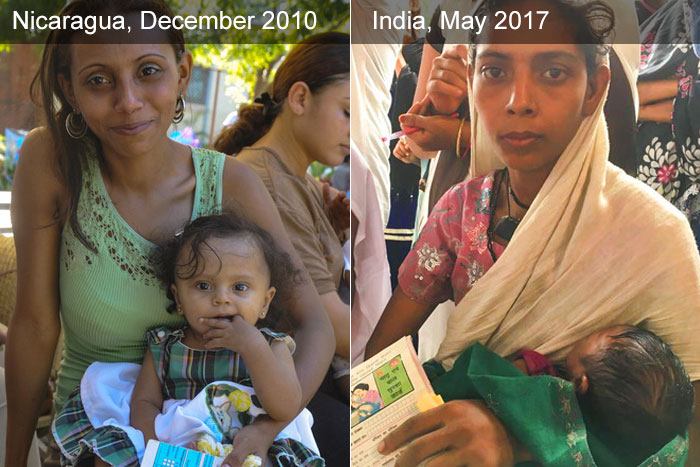
The first pneumococcal vaccine introduction through the AMC in December 2010 and the latest in May 2017. Photo: Gavi/2010/2017
More children than ever before are being protected against pneumococcal disease and that’s something to celebrate.
The AMC has enabled us to secure pneumococcal vaccines at a lower price and ensure that these vaccines reach children in the world’s poorest countries quicker than ever before.
Dr Seth Berkley, Gavi CEO
Pneumococcal vaccine is today at the forefront of the global fight against pneumonia. The vaccine is routinely delivered to children in 58 of the world’s poorest countries, has protected 109 million children from the biggest killer of under-fives and is regarded as an important component in the prevention of antimicrobial resistance.
It is easy to forget that less than 10 years ago, the vaccine hardly featured on immunisation cards in developing countries.
No one disputed the need for a vaccine with the power to protect children against one of the biggest causes of deadly pneumonia. Pneumococcal disease claims the lives of around 500,000,000 children under five every year, mainly in developing countries. Yet vaccine manufacturers had little incentive to make and supply a state-of-the-art vaccine for countries which were generally unable to afford the high prices paid in richer markets.
How the pneumococcal AMC works
The pneumococcal AMC uses donor commitments to incentivise production of pneumococcal vaccine for use in developing countries. Manufacturers, guaranteed a set price for a portion of the doses sold through the AMC, enter into legally-binding commitments to supply the vaccine to developing countries for at least 10 years at a fraction of the price paid by high-income countries.
Manufacturers participating in the AMC must provide vaccines that protect against the most deadly pneumococcal disease strains in Gavi-supported countries.
Italy, the United Kingdom, Canada, the Russian Federation, Norway and the Bill & Melinda Gates Foundation have collectively pledged US$ 1.5 billion towards the pneumococcal AMC. The AMC model has proved so successful that it is being considered as a tool for building sustainable markets in other sectors, including agriculture and climate change.
Game changer
In 2008, Gavi launched a pioneering funding model destined to change the game by changing the market – both for developing countries and manufacturers.
Donor commitments brokered through the pneumococcal Advance Market Commitment (AMC) were used to incentivise vaccine manufacturers to expand their capacity to produce pneumococcal vaccine for use in Gavi-supported countries at a fraction of the price paid by high-income countries.
Great equaliser
The impact was immediate. Before the AMC, children in the poorest countries typically received newly developed vaccines more than a decade later than children in the richest countries. Thanks to this little-known funding mechanism, developing countries could introduce the latest formulations of pneumococcal vaccine as soon as a year after they were first available. Today, 10 years after the AMC was set up, pneumococcal vaccines are offered to eligible countries at less than 10% of the US public market price.
As we mark the 10th anniversary of the AMC’s game-changing launch, an independent evaluation has confirmed the funding mechanism’s lead role in accelerating access to pneumococcal vaccines in developing countries. The AMC model has proved so successful that today it is being considered as a tool for building sustainable markets in other sectors, including agriculture and climate change.
Gavi vs pneumonia
In addition to pneumococcal vaccine, Gavi’s support for vaccinating children against pertussis, measles and Haemophilus influenzae type b (Hib) is also key to preventing pneumonia. Hib is the second most common cause of bacterial pneumonia in children.
Gavi supports pertussis and Hib vaccination as part of the pentavalent vaccine, and funds measles vaccine for both routine immunisation and campaigns
Reaching every child
Thanks to the AMC’s long-term, market-based approach, coverage with pneumococcal vaccine continues to steadily improve. Between 2015 and 2016, average coverage increased by 6 percentage points to reach 41%. This puts Gavi-supported countries almost on a par with the global coverage for pneumococcal vaccine, which stood at 42% in 2016.
However, more than 32 million children in the countries Gavi supports do not get all required doses of pneumococcal vaccine – leaving them vulnerable to pneumonia and other deadly infections. Reaching the children who are still missing out is critical to prevent children dying from pneumonia.
Antimicrobial resistance: beyond immunisation
Expanding routine use will also be a critical component in the prevention of antimicrobial resistance. Currently 700,000 people die every year because of drug-resistant virus and bacteria.
A study in the Lancet showed that universal coverage with pneumococcal vaccine could prevent more than 11 million days of antibiotic use per year in children under five, who would otherwise have been treated for pneumonia. This would have a significant impact on reducing antibiotic resistance.
